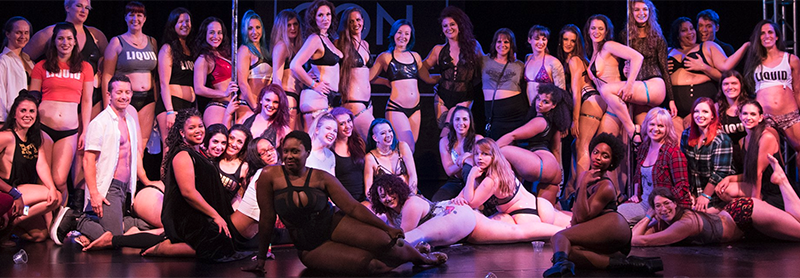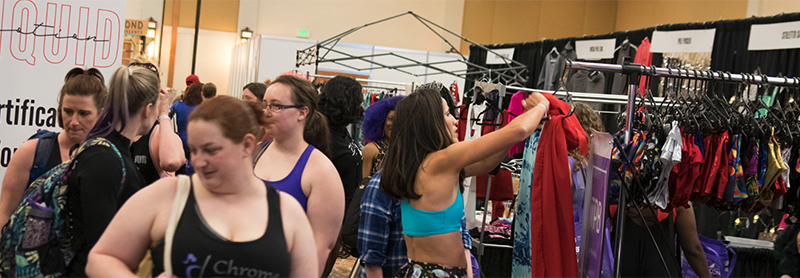Jumping back in time to the very first IPIA webinar (IPIA members can watch the…

Supporting Each Other as Humans
While the IPIA specifically focuses on the business side of pole, we are all humans with human needs and concerns.
We also, as pole business owners, studio owners, instructors, performers, and swers often hold space for other humans in an industry that is much, much more personal, and personally impactful than many other industries.
This is also an industry that supports more marginalized groups than many other industries with high concentrations of women, persons of color, and queer persons in leadership roles and as consumers.
First, take care of yourself so that you can take care of others
You can’t pour from an empty cup.
Make sure your health, finances, and family are safe and taken care of in whatever way you define those words.
Then, decide what self-care means for you.
It might be going on an artist date, starting a spiritual practice, doing those “adulting” tasks you’ve been putting off, learning to set appropriate boundaries, or anything else that helps you rejuvenate.
For those members of our industry that have enough resources to support others, consider the list below of organizations to support as well as things to do that do not cost money.
Please note, this is not an exhaustive list. Also please note, most of these resources are US-based and/or focused.
Organizations to Support
1. For Pole Dance specific
- Disabled Pole Dancers: education and representation for the disability community within pole dance. Trans, disabled, and SWer ran.
- Strippers United: SWer rights and labor organization. Mutual Aid, legal resources, community events.
- Equitable Care Certification: Certification to offer therapy to SWers. Find a SW affirming therapist.
2. For Immigration and Refugee Rights
- American Civil Liberties Union (ACLU): Works to protect the civil rights and liberties of immigrants and refugees, including legal representation and advocacy.
- Immigrant Legal Resource Center (ILRC): Provides legal resources and support for immigrants and advocates for fair immigration policies.
- RAICES: Provides free and low-cost legal services to underserved immigrant children, families, and refugees.
- United We Dream: A youth-led immigrant advocacy organization, focusing on policy change, protecting DACA, and supporting Dreamers.
3. For Climate Justice and Environmental Protection
- 350.org: An international movement focused on addressing climate change by reducing carbon emissions and advocating for green policies.
- Sierra Club: A leading environmental organization that advocates for climate action, clean energy, and protecting public lands. Website:
- Environmental Defense Fund (EDF): Works on environmental issues, focusing on tackling climate change, preserving wildlife, and reducing pollution.
4. For Healthcare Access
- Planned Parenthood: Provides reproductive health services and advocates for comprehensive healthcare, especially for marginalized communities.
- Abortion Funds: A network of organizations working together to help individuals access abortion services by providing financial assistance, logistical support, and advocacy, especially for those who face economic or other barriers.
- Families USA: Advocates for affordable health care for everyone, with a focus on those who are most vulnerable.
5. For Racial Justice and Social Equity
- Color of Change: A racial justice advocacy organization that focuses on ending practices like mass incarceration and voter suppression that disproportionately affect people of color.
- NAACP Legal Defense and Educational Fund: Works to advance civil rights through legal strategies and litigation on behalf of marginalized communities.
- Black Lives Matter: Reimagines the present and invests in the future of Black lives through policy change, investment in our communities, and a commitment to arts and culture.
6. For Labor Rights
- Fight for $15: An organization advocating for a $15 minimum wage and workers’ rights across industries.
- The National Domestic Workers Alliance: Works to improve conditions for domestic workers, many of whom are women of color.
- United Farm Workers: The union advocating for farmworkers’ rights and better working conditions in agriculture.
7. For Voting Rights and Democracy
- Fair Fight Action: Works on voting rights, voter suppression issues, and election integrity.
- Brennan Center for Justice: Focuses on protecting voting rights, reforming the criminal justice system, and preserving democratic norms.
- League of Women Voters: An organization dedicated to promoting voter education and access, and protecting voting rights.
How to Make a Difference Without Donating Money
There are many ways to support these causes without needing to donate money.
Here are several free or low-cost ways to support these organizations and their missions.
Please note, this is not an exhaustive list. Also please note, most of these resources are US-based and/or focused. Not all ideas are applicable, relevant, or advisable for all people. Do your research and make the decisions that are best for you/most aligned with your needs.
1. Volunteer Your Time
Many organizations rely heavily on volunteers to carry out their work. Whether it’s in-person or remote, there are often volunteer opportunities that allow you to contribute your time and skills.
- Abortion Funds often needs volunteers to help with phone banking, clinic escorts, organizing events, or providing logistical support.
- ACLUand Fair Fight Action might have opportunities for virtual volunteer work, like phone banking or letter-writing campaigns.
- RAICES offers volunteer roles where you can assist with legal support or provide translation services.
How to get involved:
- Visit the “Get Involved” or “Volunteer” sections on the organization’s website.
- Check social media for calls for volunteers.
- Many organizations host virtual events or grassroots campaigns where volunteers can help remotely.
2. Sign Petitions and Participate in Campaigns
Many organizations use petitions to build momentum and demonstrate public support for policy changes. Signing petitions, sharing them on social media, or encouraging others to sign can amplify a cause’s reach.
- Color of Change regularly organizes petitions to address racial justice issues.
- Brennan Center for Justice has petitions related to voting rights and other democratic reforms.
How to get involved:
- Check organization websites for active petitions.
- Share these petitions on your social media to spread the word.
- Ask your friends and family to sign and support the cause.
3. Advocate on Social Media
Social media is a powerful tool for raising awareness, educating others, and advocating for change. By sharing content from organizations, writing your own posts, or starting discussions, you can bring attention to the issues that matter.
- Share informative posts from Sierra Club about climate change or NAACP about racial justice.
- Amplify voices from marginalized groups by retweeting, sharing, or commenting on relevant posts.
- Support actions related to voting rights and abortion access by using hashtags like #DefendDACA, #BlackLivesMatter, or #AbortionAccess.
How to get involved:
- Follow the organizations on social media platforms (Instagram, Twitter, Facebook, etc.).
- Share their posts, engage in discussions, and use hashtags to spread awareness.
- Use your platform to educate your followers about policies and issues that need attention.
4. Attend Protests, Rallies, or Community Events
Participating in peaceful demonstrations or public events can send a strong message and help raise awareness. Many organizations host rallies, marches, and community events to mobilize people around important issues.
- The Movement for Black Lives or Fair Fight Action often organizes marches and events to demand action on voting rights and racial justice.
- 350.org and Sierra Club organize climate strikes and other environmental advocacy events.
- Planned Parenthood and National Domestic Workers Alliance host rallies or awareness campaigns around reproductive and workers’ rights.
How to get involved:
- Keep an eye on social media and event platforms for upcoming rallies and protests.
- Look for local chapters or nearby events that align with your values.
- If you cannot attend in person, you can also share information about events and encourage others to go.
5. Become a Local Advocate or Educator
Use your voice to inform others about key issues and encourage them to act. Hosting small gatherings or discussions with friends and family, participating in town halls, or providing information to your community can help grow collective action.
- Host an online event to discuss voting rights or racial justice with your friends and family.
- Distribute educational materials or host informational sessions about local abortion access issues and ways to support reproductive rights.
How to get involved:
- Create and share educational content about key issues (such as voting rights, abortion access, climate change).
- Engage in conversations with people who may not be aware of the struggles certain communities are facing.
- Share resources, articles, and guides from trusted organizations with your network.
6. Write Letters, Emails, or Make Calls
Contacting your elected officials is one of the most powerful ways to demand change. Many organizations provide templates and contact information for writing letters, sending emails, or making phone calls to lawmakers.
- ACLU often organizes campaigns to pressure lawmakers on issues like immigrant rights and civil liberties.
- Fair Fight or League of Women Voters frequently calls for actions to protect voting rights.
- Abortion Funds encourages people to write to policymakers to advocate for abortion access.
How to get involved:
- Find action alerts on the organization’s website, which include letter-writing or calling campaigns.
- Use the organization’s suggested scripts to contact local or national policymakers.
- Encourage others to take part in these advocacy efforts.
7. Support Local Grassroots Initiatives
Often, local groups are doing the hard work on the ground and need support to keep their efforts going. These can include mutual aid networks, voter registration drives, or local reproductive rights campaigns. Supporting these efforts can be done through direct action, such as offering your skills or participating in local events.
- Volunteer for local immigrant rights groups or abortion access networks in your area.
- Help organize community events that focus on raising awareness for climate change or racial justice.
How to get involved:
- Look up local grassroots groups and see how you can assist in organizing or spreading their message.
- Attend local town hall meetings or community discussions.
- Offer your skills—whether it’s design, writing, public speaking, or event planning—to help these initiatives grow.
8. Amplify the Voices of Those Most Affected
One of the most powerful things you can do is elevate the voices of those directly impacted by harmful policies. Share their stories, listen to their experiences, and help others understand the real-world implications of these issues.
- Share testimonies from individuals who have been affected by anti-immigrant policies or restrictions on abortion access.
- Promote platforms and podcasts that amplify marginalized voices, especially those of people of color, LGBTQ+ individuals, swers, and women.
How to get involved:
- Follow and amplify the voices of activists and organizations working on these issues.
- Share personal stories and testimonies from people whose rights are being threatened.
- Support those who are organizing within marginalized communities to build power and fight for change.



